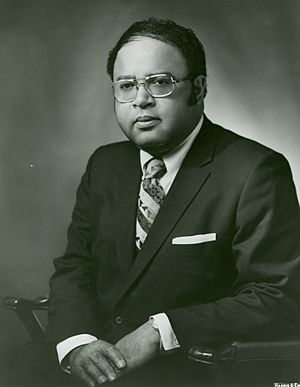Charles Diggs facts for kids
Quick facts for kids
Charles Diggs
|
|
|---|---|
 |
|
| Chair of the House District of Columbia Committee | |
| In office January 3, 1973 – January 3, 1979 |
|
| Preceded by | John L. McMillan |
| Succeeded by | Ron Dellums |
| Member of the U.S. House of Representatives from Michigan's 13th district |
|
| In office January 3, 1955 – June 3, 1980 |
|
| Preceded by | George D. O'Brien |
| Succeeded by | George Crockett Jr. |
| Member of the Michigan Senate from the 3rd district |
|
| In office 1951–1954 |
|
| Preceded by | Henry Kozak |
| Succeeded by | Cora Brown |
| Personal details | |
| Born |
Charles Coles Diggs Jr.
December 2, 1922 Detroit, Michigan, U.S. |
| Died | August 24, 1998 (aged 75) Washington, D.C., U.S. |
| Political party | Democratic |
| Spouse | |
| Education | University of Michigan Fisk University Wayne State University (BS) Michigan State University |
| Military service | |
| Allegiance | |
| Branch/service | |
| Years of service | 1943–1945 |
| Battles/wars | World War II |
Charles Coles Diggs Jr. (December 2, 1922 – August 24, 1998) was an American politician from Michigan. He made history as the first African American elected to Congress from Michigan.
A member of the Democratic Party, Diggs played an important role in the early Civil Rights Movement. He gained national attention in 1955 for attending the trial of those accused of murdering Emmett Till. He also became the first chairman of the Congressional Black Caucus. Diggs was a strong critic of apartheid in South Africa. He resigned from Congress later in his career.
Contents
Early Life and Beginnings
Charles Coles Diggs Jr. was born in Detroit, Michigan, on December 2, 1922. He was the only child of Mayme E. Jones Diggs and Charles Diggs Sr.. His father was also a politician.
Charles Jr. went to several universities, including the University of Michigan and Fisk University. He served in the United States Army during World War II from 1943 to 1945. After his military service, Diggs worked as a funeral director. His family owned the House of Diggs, a large funeral home in Michigan.
Before joining Congress, Diggs served in the Michigan State Senate. He represented the 3rd district from 1951 to 1954. His father had also served in the state senate years earlier.
A Career in Congress
In 1954, Charles Diggs Jr. won the election to become a U.S. Representative. He defeated the person who held the seat before him, George D. O'Brien. Diggs then served in Congress from January 3, 1955, until June 3, 1980. He was re-elected twelve times, showing strong support from voters.
Fighting for Civil Rights
As the first African American from Michigan in Congress, Diggs worked hard for civil rights. In April 1955, he gave a powerful speech in Mound Bayou, Mississippi. This speech was at a conference for the Regional Council of Negro Leadership, a major civil rights group.
Later that year, Diggs returned to Mississippi for the trial of the men accused of killing Emmett Till. Till was a black teenager from Chicago who was murdered while visiting the state. Diggs was the only congressman to attend the trial. He sat with black reporters due to unfair Jim Crow laws. The outrage from this case helped the civil rights movement grow. After the trial, Diggs helped a witness, Willie Reed, travel safely to Detroit.
Diggs continued to push for justice. He asked President Eisenhower to call a special meeting of Congress. This meeting would focus on new civil rights laws.
Leading the Congressional Black Caucus
Charles Diggs Jr. was a founding member of the Congressional Black Caucus. This group is made up of African-American representatives and senators. They work together to address the needs and rights of black communities. Diggs was also the first chairman of this important group.
While he was chairman, Diggs led the caucus in a protest. They boycotted President Nixon's State of the Union Address. This happened because Nixon refused to meet with them to discuss issues important to African Americans.
Against Apartheid in South Africa
In 1969, Diggs became chairman of the Subcommittee on Africa. This group was part of the United States House Committee on Foreign Affairs. He strongly spoke out against apartheid in South Africa. Apartheid was a system of racial segregation and discrimination.
Diggs actively supported the fight for freedom in South Africa. In 1972, he wrote an "Action Manifesto." In this document, he criticized the United States government. He felt they did not do enough to condemn the violence used by the South African government. Diggs also argued that American companies were helping apartheid by investing there. Because of his strong views, the South African government banned him from visiting the country.
Later Years
In 1978, Charles Diggs Jr. faced legal challenges. He was accused of misusing funds related to his staff's salaries. He was found guilty of several charges later that year. Despite this, he was re-elected to Congress while waiting for his sentence.
The House of Representatives officially criticized him in 1979. He resigned from Congress in June 1980. He served time in prison, though he always said he was innocent.
Charles Diggs Jr. died from a stroke on August 24, 1998, in Washington, D.C.. He is buried in Detroit Memorial Park in Warren, Michigan.
Images for kids
See also
- List of African-American United States representatives
- List of American federal politicians convicted of crimes
- List of United States representatives expelled, censured, or reprimanded


